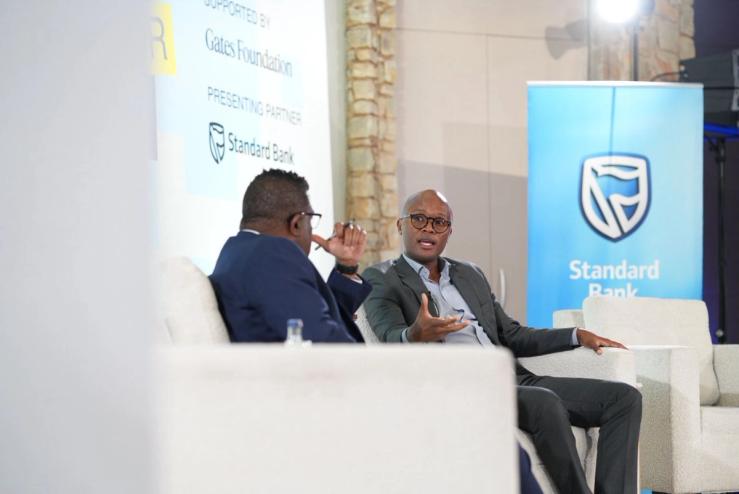The News
South Africa’s digital minister ruled out giving Elon Musk’s Starlink, or any other foreign tech firm, a special regulatory shortcut into the country, insisting that they “play by the same rules” as local operators.
“The credibility of any regulatory regime lies in its consistent and fair application towards everyone,” Solly Malatsi told Semafor at The Next 3 Billion event in Johannesburg this week. He added that any speeding up of South African regulatory processes could not come at the cost of creating the perception that foreign firms could leapfrog local requirements: “We want investment, but we cannot undermine the principles that define our economic landscape.”
Pretoria-born Musk has repeatedly criticized South Africa’s Black Economic Empowerment (BEE) rules, blaming them for ostensibly hindering his plans to expand Starlink in the country. The post-apartheid policy requires companies to prioritize Black co-ownership, management, and community investment. The authorities have been considering ways for foreign players like Starlink to invest in the country without complying with BEE rules, but the effort has faced significant political pushback from the coalition government’s dominant African National Congress.
In this article:
Know More
The minister’s comments come as South Africa strives to expand internet access while also trying to overhaul a regulatory environment widely seen as slow, fragmented, and out of step with global competitors.
Malatsi acknowledged that the licensing system — which involves different approvals at municipal, provincial, and national levels — has become a major bottleneck for telecom and infrastructure players. Companies applying for broadband, satellite, or local permissions often face months-long delays and inconsistent rules across regions.
While more than 95% of South African households have access to a mobile or fixed line, about 20% of the population still does not actively use the internet. Affordability remains the main barrier: Even as data prices have declined, for many lower-income households, the cost of mobile subscriptions or data bundles still strains monthly budgets.
On top of that, device costs are prohibitive. For years, smartphones in South Africa were taxed as “luxury items”, particularly entry-level devices, driving up their prices,” noted the minister. Only 44% of South Africans owned a smartphone in 2023, largely due to cost constraints, according to GSMA, the global mobile trade body.
Malatsi argued that fiber has reached its practical limits — too costly to extend into remote or rural parts of the country — and that satellite networks like Starlink offer a faster, more scalable way to close South Africa’s connectivity gap.
Yinka’s view
Malatsi’s position reflects a serious regulatory dilemma. He wants to attract foreign players who can rapidly expand coverage, but he’s equally determined not to undermine the core principles of BEE or create the perception that powerful multinationals can sidestep rules local firms must follow. The minister also recognizes that satellites offer a fast, scalable way to deliver broadband to millions currently offline — vital for social inclusion and economic growth. But by refusing to grant Starlink a regulatory “fast lane,” he risks alienating part of the global capital that could help deliver that future.
At the same time, the BEE rules aren’t just a box to tick — they’re politically and morally central to South Africa’s economic transformation strategy. If he relaxes them too much, the government will face a backlash from domestic stakeholders who view BEE as fundamental. On the other hand, if the rules remain rigid, Malatsi warns that South Africa risks losing out to more agile African economies like Kenya, Rwanda, or Nigeria — places that are already courting digital technology investment with more flexible regulatory regimes. “If we suffocate this sector with unnecessary regulations we are going to miss this unique opportunity that I think South Africa has,” he told me on stage.
Here’s the minister’s gamble: that he will be able to reform the digital licensing framework (simplifying licenses, harmonizing approvals) while preserving the spirit of empowerment. Yet as Malatsi himself noted, time is not infinite; global satellite firms and other tech partners are circling, but capital may flow elsewhere if he’s unable to convince the powers that be to be more flexible in a timely fashion.
Room for Disagreement
Some civil society organizations have cautioned that easing rules for foreign firms could dilute the impact of BEE and its progress, turning transformation into a cosmetic gesture rather than real economic empowerment. “Some actors opposing these measures have historically resisted BEE,” warned a May statement from the BEE group’s ICT sector council. “These developments threaten to sideline South Africa’s legal framework and long‑standing transformation objectives.”
Notable
- South Africa’s Telkom is in talks with satellite providers for partnerships to boost its rural connectivity, Reuters reported.


